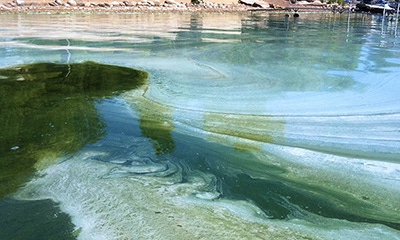
Vermont and Pennsylvania farmers have more environmental headaches coming and in common than most might think. Pennsylvania agriculture is being pushed to clean up Chesapeake Bay watershed tributaries. Vermont farms face new regulatory efforts to clean up its side of Lake Champlain, particularly its northern-most Missisquoi Bay Basin.
Both states are under the regulatory gun to meet U.S. EPA’s total maximum daily load goals. Both pushes began initially by lawsuits by Chesapeake Bay Foundation and the Conservation Law Foundation, respectively. And, both are grappling with the lack of documentation of on-farm conservation practices already in place. That, too, is in process of changing.

BLOOMING ALGAE: Missisquoi Bay waters overwhelmed by nutrient-fed algae are a summertime clue of trouble for fish and other aquatic life. Photo courtesy of Conservation Law Foundation
The most recent chapter in Vermont’s water quality struggle unfolded as Vermont Ag Secretary Chuck Ross, issued his revised decision. It comes as a result of CLF’s petition to require mandatory best management practices for Missisquoi Bay Basin farms.
“I believe the farm assessment and BMP implementation timelines we negotiated in good faith with CLF align well with the implementation plans required by the Total Maximum Daily Load (TMDL) and Act 64,” says Ross. He thanked CLF for their collaboration in working to develop a settlement workable for farmers and meet Vermont’s water quality goals.
What’s in the settlement package
Basically, it provides a framework for outreach, education and assessment of farms in the watershed and a process for farm-specific development and implementation of a farm plan to address identified water quality resource concerns, where needed. Farm assessments may conclude that practices already mandated by the Required Agricultural Practices regulations are sufficient to protect water quality and that BMPs may not be required due to a farm’s specific characteristics or management.
* The revised decision has determined that BMPs beyond those required by RAPs, are generally necessary on all farms in the Missisquoi Bay Basin watershed to comply with state water quality goals. BMPs are site-specific conservation practices.
Those practices include but not limited to expanded perennial vegetated buffers, increased stabilization of field gully erosion, increased livestock exclusion areas, manure injection or incorporation, cover cropping and improving farm practices for reducing nutrients and waste. The goal is to achieve “T-value” (tolerable soil loss values as defined by Natural Resources Conservation Service for the field’s prevalent soil type.
~~~PAGE_BREAK_HERE~~~
* The ag agency will conduct farm assessments in the watershed to assure BMPs are put into place. In essence, farms will be required to have an approved farm conservation plan.
* During the first year, the ag agency will focus on making sure farms in the watershed understand what’ll be required and provide financial assistance for developing conservation plans.
* One year after implementation, the agency will notify large, medium and other farm operations shipping mild, plus small farms requiring certification of conservation practices.
* All farms will be expected to have the BMPs in lace to prevent potential ag pollution within five years of the assessment.
For more specifics, read the VAAFM’s full 15-page revised decision at http://agriculture.vermont.gov/water-quality/news-events/clf-petition or call the agency at 802-828-2431 for a copy.
For more on farmer concerns over the regs, see Small farm coalition raps environmental rap regs.
About the Author(s)
You May Also Like




